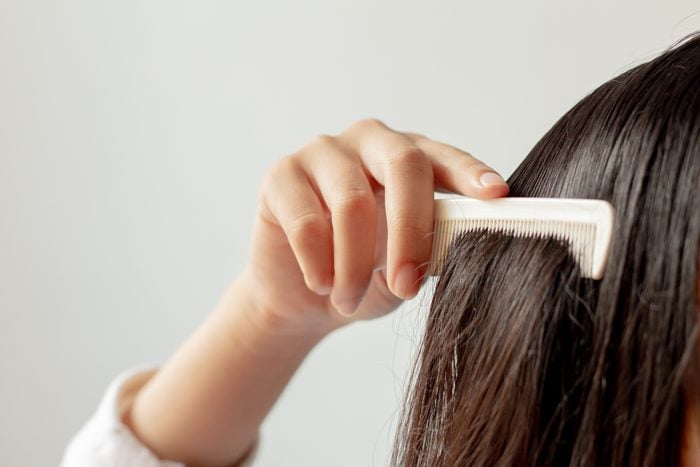
Why is my hair falling out?
You lose anywhere from 50 to 100 strands of hair each day. That’s normal. But hair loss and excessive shedding can be caused by everything from medications and hormones to nutrient deficiencies and stress. If your hair is falling out, it’s trying to tell you something about your health. Here’s everything hair experts need you to know about the causes of hair loss.
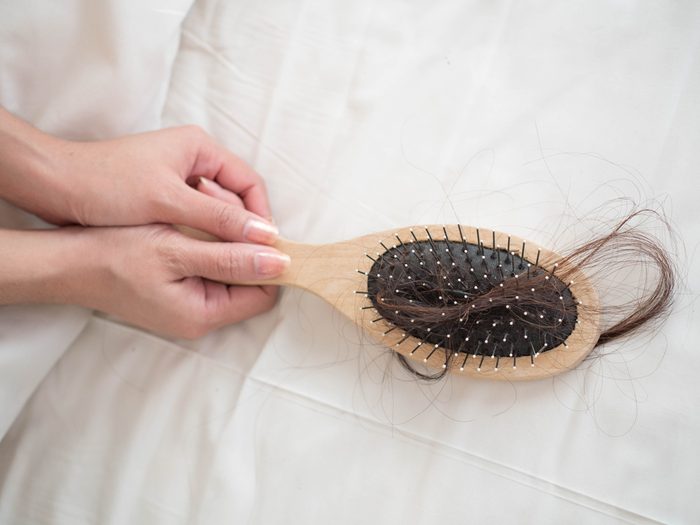
You have a hormonal disorder
When women have a hormonal disorder that causes high levels of testosterone, including polycystic ovary syndrome (PCOS), they may experience thinning of hair on the scalp. Often these conditions are also associated with acne, irregular periods, and hair growth in areas typically seen in men, says Joshua Zeichner, MD, director of cosmetic and clinical research in dermatology at Mount Sinai Hospital in New York City. “Over-the-counter supplements, such as Nutrafol, can help provide the follicles with the necessary building blocks for healthy hair production,” he says.
You’re not protecting hair from sun
“The sun damages the cuticle, allowing harmful rays and heat to penetrate deeper,” explains dermatologist Dendy Engelman, MD, of Medical Dermatology & Cosmetic Surgery Centers. “Additionally, exposure to free radicals without antioxidants to neutralize them can cause serious oxidative stress to the body and, in this case, the hair.” Try using a sun protection spray, such as Living Proof Restore Instant Protection, or Clarins Sun Care Oil Spray. (Here are some easy ways to help your sun-damaged hair.)
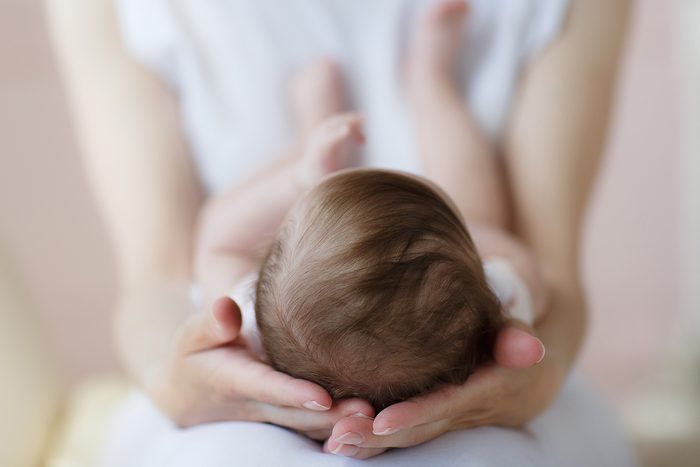
You just had a baby
While pregnant, many women notice that their mane becomes thicker, fuller, and shinier, thanks to a surge of pregnancy hormones. However, once they deliver, this flood of hormones leaves their body at a rapid pace, often leaving them with little time to adjust. One side effect of this depletion of hormones is hair loss. Thankfully, for many women, their hair goes back to normal a few months postpartum. (Check out these other surprising ways you look different when you’re pregnant.)
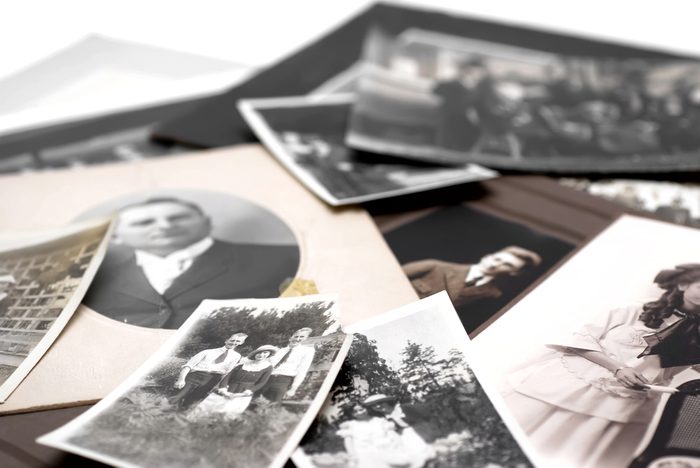
It’s in your genes
Just like with your hair color and hairline, your genes often determine whether you’ll experience thinning hair. It’s a myth that you inherit your hair loss gene from your mother’s father, says Dr. Zeichner. “There are many genetic causes. Women tend to develop a widening of their part line and thinning of hair on the top of the head, but typically do not fully lose their hair in the way that men do.” You can help stem the tide of hair loss by reducing stress, avoiding very tight hairstyles (ponytails, braiding) that contribute to hair loss, and eating a nutrient-rich diet, but once the hair is gone, your best bet may be camouflage. “In situations where there is no treatment, women can hide bald or thinning spots by changing their hairstyle or wearing hats, headbands, and scarves,” says Ramon Padilla, founder of EverTrue, a Microblading Salon in Manhattan. “But a more long-term solution is permanent makeup, such as our Hairline Rescue treatment, where we re-create the look of hair strands stroke-by-stroke.” The treatment is like a semi-permanent tattoo that lasts about 18 months.
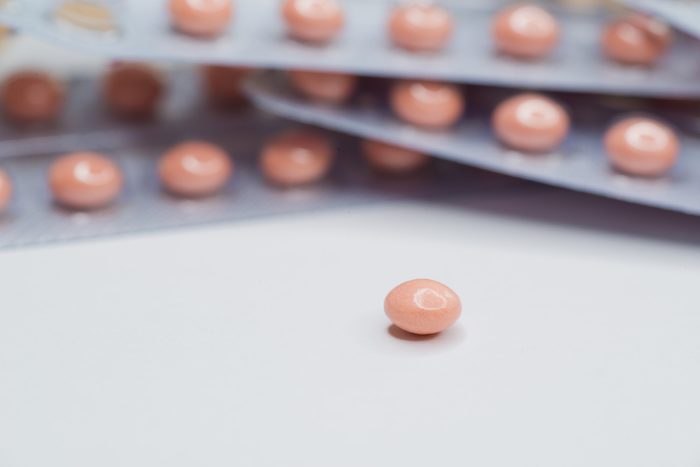
You’re taking birth control pills
Just like pregnancy, birth control pills mess with your hormone levels, causing them to fluctuate. In response, you might experience hair loss. “Hormones can interrupt the natural pattern of the hair cycle, causing hairs to shed more quickly than usual or to grow with less vigor,” explains Dominic Burg, PhD, chief scientist for Advangen. Oftentimes the hormone responsible for this is an androgen, such as testosterone, which is why the American Hair Loss Association recommends low-androgen birth control pills for those who are at an increased risk for hair loss.

Your diet
That old saying, “You are what you eat,” has some truth to it, and your hair certainly requires a great deal of energy and nutrients to stay healthy. “The cells in your hair follicles divide faster than others in the body and grow quickly,” explains Burg. “At the same time, building the hair shaft out of keratin takes a lot of energy.” It’s important to maintain a healthy, well-balanced diet full of all the necessary nutrients your body—and hair—needs. “Lack of nutrients, especially the B vitamins, zinc, and iron can severely disrupt the hair cycle and cause the follicles to go into premature hibernation, which is then followed by excess hair fall,” he adds. (Not sure where to start? Try these high-biotin foods that make your hair and nails healthier.)
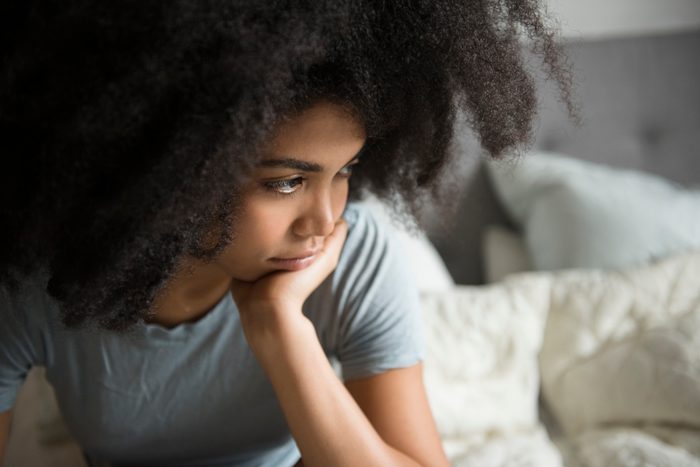
You’re super stressed
Being stressed affects nearly every aspect of your life—even your strands. “Stress affects hormonal levels, specifically cortisol, which then causes hair loss, which only adds more stress to an already stressful situation,” says Penny James, IAT-certified trichologist and owner of Penny James Salon in New York City. “The positive side to all this is once you reduce the stress in your life, your hair will grow back to normal.” She recommends incorporating activities such as yoga or meditation to reduce stress levels. (Here’s how to repair damaged hair with items you already own.)
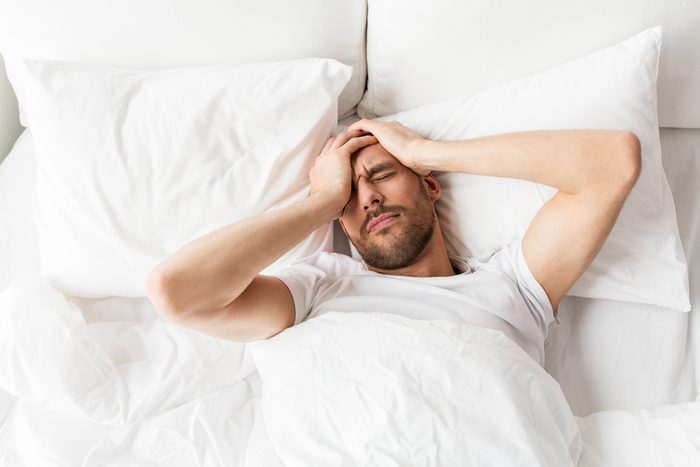
You have an underlying illness
Periods of prolonged or severe illness can affect your hair. “As with extreme stress and extreme diets, this also comes down to the body preserving its energy balance and shutting down non-essential functions in order to battle the illness more effectively,” Berg says. “In fact, physicians have used an inspection of the fingernails and hair quality as part of standard examinations of overall health for many years. Changes in these features provide some clues about the length and severity of illness.” Other diseases, such as diabetes and lupus, also can cause hair loss. (Check out these other things your hair can reveal about your health.) Covid-19 and hair loss are also linked. The temporary shedding, telogen effluvium, is due to high levels of stress and also occurs with other significant illnesses or surgery.
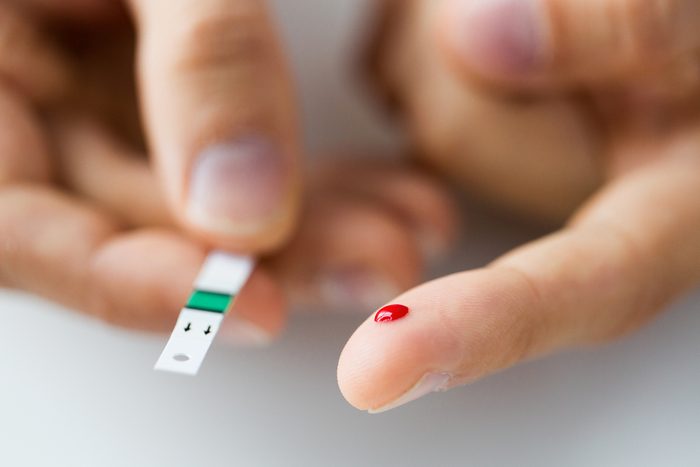
You’re iron deficient
“Iron is an important mineral needed for development of our blood cells and healthy functioning of the body,” says Dr. Zeichner. “In cases when patients are iron deficient or have low red blood cell levels, they may experience some thinning of the hair.” Stock up on the foods with the most iron to encourage regrowth.

You’re taking certain medications
“Many prescription drugs, often those that affect hormones, can lead to changes in the hair. One frequent culprit is anti-acne medications, specifically those that involve types of retinol (vitamin A),” explains Burg. “There are also reports of some anti-aging creams containing retinols causing hair loss.” It is unclear how these medications interfere with hair growth, but disruption of the hair cycle is a common issue, he adds. Learn about skin care ingredients you should never mix.
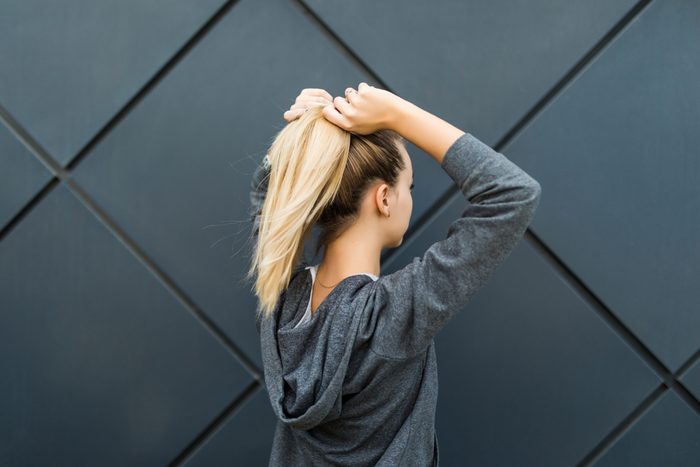
Your hairstyle
How you wear your hair on a daily basis may influence how healthy it is. “Wearing a tight ponytail, braid, or extensions may, over time, put stress on the hair follicle and lead to hair shedding and permanent loss,” says Dr. Zeichner. He recommends wearing looser styles or wearing your hair down as much as possible. Check out these miracle-working hair products every woman needs.
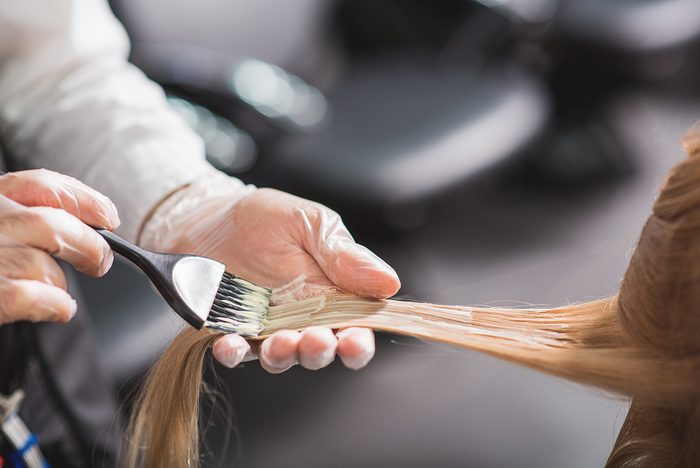
You over-process your strands
In addition to your hairstyle, the processes you use on your hair, whether it’s to add color or texture, can have a detrimental effect. For example, harsh chemicals for bleaching and straightening, along with excess heat, can damage and even kill hair follicles, Burg points out. Excessive chemical treatments applied directly on the scalp can cause inflammation. “Inflammation can damage the follicle, which in turn can lead to hair loss,” says Maria Halasz, CEO of évolis Professional. To prevent over-processing, she recommends limiting chemical treatments on the scalp to every four to six weeks. (Check out these tips for people who use heat on their hair every day.)
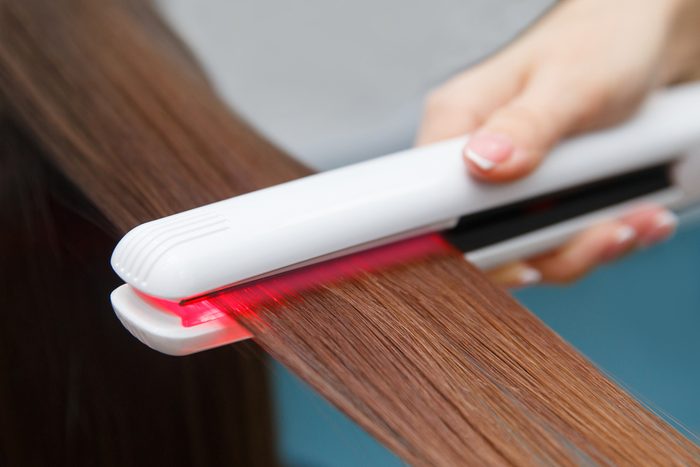
You over-use hot tools
You might love the way your hair looks after using your curling iron or straightener, but the damage it causes might leave your hair thinning. James warns that setting your tools to 450 F or higher or keeping your hair on the hot tool for too long can burn your hair and potentially cause it to break off. “Set your flat iron or curling iron on medium heat and work with smaller sections, which require less time on the hot tool.” To ease yourself off, try these ways you can curl your hair without a curling iron.
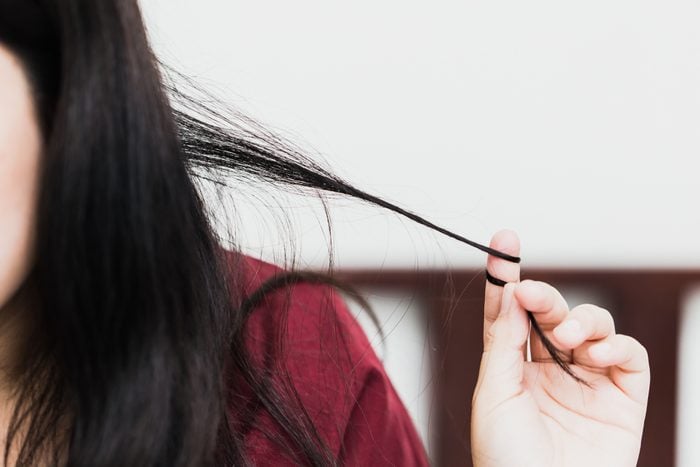
You have trichotillomania
Some hair loss can result from the psychological condition trichotillomania. “People with this condition compulsively pull out their hair when they are stressed or even when they are concentrating, e.g. studying hard,” says Burg. “Sometimes the individual doesn’t know they are pulling their hair out, doing the activity absentmindedly, and only notice once the bald patches appear.” Over time the hair follicles can become so damaged that they die and leave permanent bald patches.
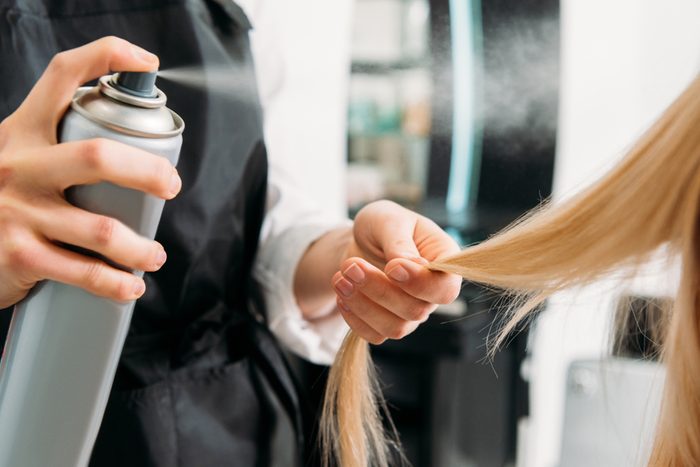
You overuse dry shampoo
It’s become popular to not wash your hair for several days; in fact, some believe it’s beneficial for the hair. While you shouldn’t over-wash your hair, under-washing—washing your hair once or twice a week—and camouflaging dirt and grime with dry shampoos isn’t good for your hair either. “Overuse of dry shampoos leads to clogged follicles, which, over time, can cause permanent damage leading to hair loss,” warns Halasz. “To prevent this from happening, try to wash your hair a minimum of every three to four days.”
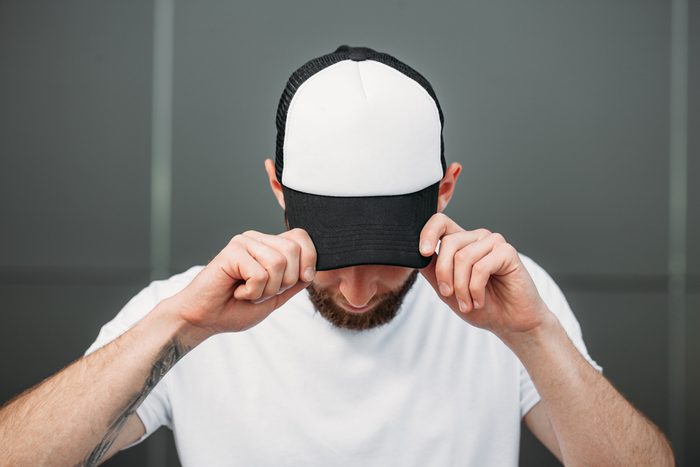
You constantly wear hats
Hats do a great job of covering your hair, protecting your scalp from sun and environmental stress, but Halasz warns that hats also rub the same spot over and over, especially if worn for consecutive days. “This type of friction can pull the hair, which can lead to inflammation of the follicle,” she says. “Prolonged inflammation can lead to permanent damage, which in turn leads to hair loss.” Bottom line: Give hats a rest for a few days to protect your strands.

